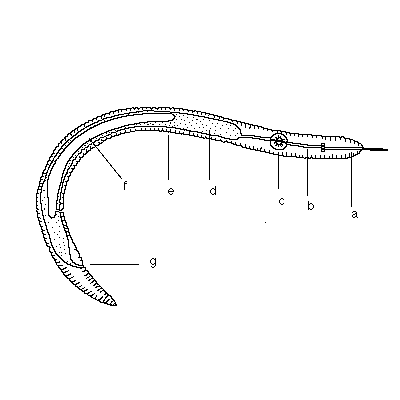Nematode Garden Crisis
“While most of the thousands of species of nematodes on Earth are not harmful, some nematodes parasitize and cause diseases in humans and other animals. Also, unfortunately, there are many that attack and feed on living plants.” —Organic Gardening.com
The garden-shutdown, precipitated by a minority of garden participants belonging to the Ancient Intransigent Nematodes of Tea (AIN’T), shocked the woman with a beard. The bleeding hearts cried soft nectar tears.
The toad flew in from a marsh in Africa to join a meeting of garden life-forms. A few frogs chorused in greeting as he joined. The snails still arrived last.
Only a small number of obstructionist nematodes instigated the crisis. Their purported love of tea remains beside the fact.
They refused to participate in the interdependence of the garden, insisting on withholding compost from the garden until all life forms reformed the cycles of birth, life, death, decomposition, rebirth through re-uptake by others so only AIN’T would benefit.
Opposed to Socialist composting, they insisted that leaves, cuttings, wintered stalks, and similar products, belonged only to the seeds that produced them and their favored worms, who re-processed them. They denied that soil, other compost, rain, sun, air, or symbiotic life-forms contributed to producing these valuable food sources.
In short, they rejected biological interdependence with a parasitic vengeance that threatened the ecological balance of the garden.
As far as their thinking took these worm-brains—which was not very far, for, after all, they were nematodes—as far as they could figure, the food source belonged to the seeds that produced it.
The nematodes that processed it, of course, took their take.
Their take on things did not agree with the rest of the garden creatures congress. AIN’Ts destructive-purposed refusal to participate in the necessary budgeting of energy, time, and resources to the process had now frozen the garden solid.
They had closed down the garden.
They brought December, but January loomed ahead. Then the coldest temperatures would penetrate deep into the soil. The whole garden could collapse.
Without the protection of compost, the warmth of its decomposition process, the absorption of solar heat by its darkness—without the slight warmth from this necessary system, the roots of all plants would freeze solid. All of the seeds would die.
This did not bother the nematodes.
They didn’t believe in January, global warming, the cycle of life that produced the garden or the inter-dimensional mathematical and geometrical recursive reflections of its essence.
The worms only believed in eating what they wanted for themselves and in a firm denial of their reliance on others.
They pretended an interest in the seeds, but they knew all seeds die when they grow into plants. They did not care for the plants, despite AIN’T rhetoric.
The nematodes only wanted the aftermath of compost to themselves. And after the math, which they did not understand, they only wanted for themselves and their own everything they could incorporate into their worm bodies.
The toad and a few bird friends feasted on the AIN’T worms. The rest of the garden life-forms worked together to dig the compost out and to spread it on the garden.
Meanwhile, the woman with a beard tried to recruit AIN’T nematodes committed to interdependence.
The toad discouraged her, saying this group were only soil pests anyway.
The toad flew to a marsh in a Caribbean Rain Forest to hibernate for the winter.
The garden survived. Barely.

You can read this story
and other Flash Fiction by Michael Dickel
in The Palm Reading after the Toad’s Garden
Categories: Flash Fiction

















I very much enjoy your garden analogies to current events, Michael. And I love beneficial nematodes.
LikeLike
loved this. And it made me interested enough to research nematodes!
LikeLike
Worm-like critters. Some info at the OrganicGardening.com link and the nematodes link 🙂
Glad you liked it.
Thank you!
LikeLike
Creative, thought-provoking and most enjoyable. Thanks.
LikeLike
Glad you enjoyed it, Jonathan. Thanks for the comment.
LikeLike